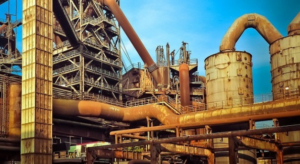Wasted Resources: Idle Ajaokuta Workers Received ₦38.9 Billion in Salaries Over 10 Years without working
Wasted Resources: Idle Ajaokuta Workers Received ₦38.9 Billion in Salaries Over 10 Years without working

The Federal Government has disbursed ₦38.9 billion in salaries and allowances to employees of the defunct Ajaokuta Steel Company over the past decade, according to First Class Gists. This substantial sum has been paid despite the company’s failure to produce any steel since its inception.
Conceived in 1979, the Ajaokuta Integrated Steel Complex was designed to establish a Metallurgical Process Plant along with an Engineering Complex and various supporting facilities. The complex was intended to drive significant industrial and economic activities critical for Nigeria’s economic diversification.
According to the company’s website, it initially employed around 10,000 workers during the first phase of its commissioning, with an expected total workforce of around 500,000 for the associated upstream and downstream industries.
The Ajaokuta Steel Plant, often referred to as the foundation of Nigeria’s industrialization, features four distinct rolling mills: the Billet Mill, the Light Section Mill, the Wire Rod Mill, and the Medium Section and Structural Mill. The plant employs blast furnace technology, which accounts for approximately 70% of global liquid steel production.
By 1994, the plant was reportedly 98% complete in terms of equipment installation. Although 40 out of the 43 planned units were constructed, mismanagement has left the project incomplete for over 45 years.
In 2019, at the Russia-Africa Summit, former President Muhammadu Buhari and Russian President Vladimir Putin agreed to revitalize the steel mill with Russian support and funding from the Afreximbank and the Russian Export Centre. However, this initiative was delayed by the COVID-19 pandemic and was eventually abandoned.
In January 2024, discussions were initiated with China’s Luan Steel Holding Group to revive Ajaokuta Steel Company, but these talks have yet to produce results.
Despite the plant’s inactivity and reports of an ineffective workforce, it continues to receive significant annual budget allocations. A breakdown of expenditures between 2014 and 2024 reveals that ₦29.11 billion was spent on salaries and wages, with an additional ₦9.8 billion allocated for allowances.
The analysis shows that in 2014, ₦3.82 billion was allocated for personnel costs, slightly decreasing to ₦3.8 billion in 2015 and ₦3.55 billion in 2016. The figure rose to ₦3.84 billion in 2017, and in 2018, the amount spent on salaries and allowances reached ₦3.76 billion. This increased to ₦3.2 billion in 2019, ₦3.5 billion in 2020, and further to ₦3.89 billion in 2021 and ₦3.94 billion in 2022. However, the expenditure fell significantly to ₦1.22 billion in 2023. There was no announced retrenchment during this period, and costs surged by ₦3.07 billion to ₦4.29 billion in 2024.
Senator Natasha Akpoti-Uduaghan, representing Kogi Central, recently questioned Sole Administrator Summaila Akaba about the salaries paid from the ₦4.2 billion allocated for personnel costs in the 2024 budget. She reported that, during her visits, she rarely found more than 10 people working, raising concerns about the legitimacy of the salaries being paid.
The National Assembly increased the budget for Ajaokuta Steel Company in 2024 from ₦4.45 billion to ₦5.18 billion, reflecting a ₦730 million rise as the government aims to revive the plant.
Minister of Steel Development, Shuaibu Audu, stated that the government is working on raising over ₦35 billion to restart the Light Mill Section of Ajaokuta Steel Company, with expert estimates indicating a need for between $2 billion and $5 billion to fully revive the plant within three years. Despite this, experts suggest that privatization might be the most effective strategy for maximizing the plant’s potential.
Economist Paul Alaje criticized the ongoing payments as a waste of resources and advocated for a public-private partnership to revitalize the steel plant. He highlighted the inefficiencies of continuing to pay salaries for non-existent work and suggested that engaging the private sector or partnering with foreign companies might be a more viable solution.
Professor Abayomi Adebayo of Obafemi Awolowo University also condemned the ongoing salary payments as a drain on Nigeria’s scarce resources, recommending the termination of these appointments to prevent further waste.
TRENDING SONGS
 WOMAN REVEALS HOW PATIENCE AND TIMING HELPED HER BUILD A PEACEFUL FIVE-YEAR MARRIAGE
WOMAN REVEALS HOW PATIENCE AND TIMING HELPED HER BUILD A PEACEFUL FIVE-YEAR MARRIAGE
 How N100m Was Mistakenly Paid Into Egbetokun’s Son’s Personal Account — FPRO
How N100m Was Mistakenly Paid Into Egbetokun’s Son’s Personal Account — FPRO
 RCCG PASTOR ANGRY OVER CALLING Him“MR” INSTEAD OF “DR,” DECLARES CURSE ONLINE
RCCG PASTOR ANGRY OVER CALLING Him“MR” INSTEAD OF “DR,” DECLARES CURSE ONLINE
 NPMA Appeals to Nigerian Government for Compensation After Lagos Market Fire
NPMA Appeals to Nigerian Government for Compensation After Lagos Market Fire
 Rest Every Four Hours, FRSC Issues Safety Guide for Fasting Motorists
Rest Every Four Hours, FRSC Issues Safety Guide for Fasting Motorists
 NNPC Boss Ojulari Bags UK Energy Institute Fellowship
NNPC Boss Ojulari Bags UK Energy Institute Fellowship
 Shock in Anambra: Bride Disappears Moments Before Wedding
Shock in Anambra: Bride Disappears Moments Before Wedding
 Nigerian Woman Returns ₦330 Million Accidentally Credited to Her Account
Nigerian Woman Returns ₦330 Million Accidentally Credited to Her Account
 APC Don Reach Morocco?’ VeryDarkMan Reacts to Seyi Tinubu Poster
APC Don Reach Morocco?’ VeryDarkMan Reacts to Seyi Tinubu Poster
 Bride Breaks Down in Tears as Wedding Meals Were Kept Secretly While Guests Go Home Hungry
Bride Breaks Down in Tears as Wedding Meals Were Kept Secretly While Guests Go Home Hungry
Share this post with your friends on ![]()













